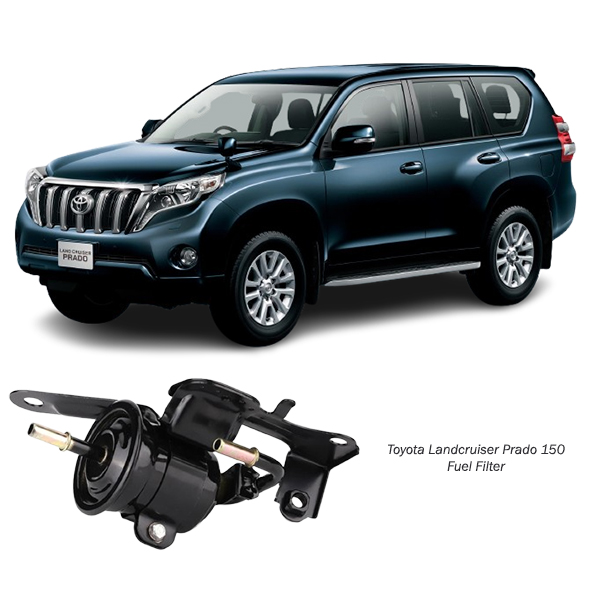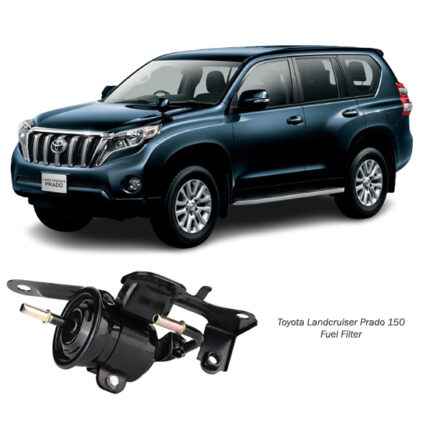Get Toyota Land Cruiser Prado 150 Fuel Filter Assy 23300-50150 in Kenya
The fuel filter assembly is a critical part of a vehicle’s fuel delivery system, designed to ensure that the engine receives clean, contaminant-free fuel for optimal performance. By removing impurities such as dirt, rust, and debris from the fuel, this component protects sensitive engine parts and maintains efficiency. This article explores the functions, benefits, types, maintenance, and considerations related to fuel filter assemblies in detail.
What Is a Fuel Filter Assembly?
A fuel filter assembly comprises the filter itself and its associated components, including housings, connectors, and sealing mechanisms. Its primary function is to filter out contaminants from the fuel before it reaches the engine. Clean fuel ensures efficient combustion, smooth operation, and prevents damage to components like injectors and fuel pumps.
How It Works
The fuel filter assembly is located along the fuel line, between the fuel tank and the engine. Here’s a step-by-step explanation of its operation:
- Fuel Flow: Fuel is pumped from the tank through the fuel filter assembly by the fuel pump.
- Filtration: As the fuel passes through the filter element, contaminants are trapped by the filter medium while clean fuel continues to the engine.
- Pressure Regulation: In some designs, the assembly includes a pressure regulator to ensure consistent fuel delivery to the engine.
- Continuous Process: This cycle occurs every time the engine operates, ensuring clean fuel is constantly supplied.
Components of a Fuel Filter Assembly
- Filter Element: The core component, typically made of paper, synthetic fibers, or a combination of both. It traps contaminants.
- Filter Housing: Protects the filter element and ensures proper fuel flow. Made of metal or plastic, it is designed to withstand pressure and environmental conditions.
- Seals and O-Rings: Prevent fuel leaks by creating a secure seal between the filter and housing.
- Inlet and Outlet Ports: Allow fuel to enter and exit the filter assembly.
- Drain Valve (Optional): Found in some fuel filters, it allows water or other contaminants to be drained from the filter.
Types of Fuel Filters
Different types of fuel filters cater to various vehicle designs and fuel types:
- Inline Filters: Installed along the fuel line and commonly found in older vehicles.
- Cartridge Filters: Found in modern vehicles, these have a replaceable filter element housed in a permanent casing.
- Spin-On Filters: A disposable filter with a built-in casing, easy to replace.
- Water Separating Filters: Specifically designed for diesel engines, these remove water from the fuel in addition to contaminants.
- Integrated Filters: Built into fuel pumps or fuel injector systems in some advanced engines.
Benefits of a Fuel Filter Assembly
A well-maintained fuel filter assembly offers numerous advantages:
- Improved Engine Performance: Clean fuel ensures efficient combustion, providing better power and acceleration.
- Protection of Fuel System Components: Prevents damage to injectors, fuel pumps, and carburetors caused by dirt and debris.
- Increased Fuel Efficiency: Minimizes fuel wastage by ensuring proper atomization in the combustion chamber.
- Reduced Emissions: Clean fuel combustion results in fewer harmful exhaust emissions, contributing to environmental protection.
- Extended Engine Lifespan: By keeping contaminants out, it reduces wear and tear on engine parts, prolonging the engine’s operational life.
Importance of Fuel Filter Assembly for Diesel Engines
Diesel engines are more susceptible to water and particulate contamination than gasoline engines. Water can cause rust and corrosion in the fuel system, while particulates can clog injectors. Diesel-specific fuel filter assemblies often include a water separator, making them essential for maintaining the reliability and efficiency of diesel engines.
Signs of a Failing Fuel Filter Assembly
A failing or clogged fuel filter can cause noticeable performance issues. Common signs include:
- Engine Misfires or Stalling: Restricted fuel flow can lead to incomplete combustion or engine shutdown.
- Difficulty Starting the Engine: A clogged filter can make it harder for fuel to reach the engine.
- Reduced Power: Insufficient fuel delivery can result in a lack of acceleration or sluggish performance.
- Poor Fuel Economy: The engine may consume more fuel to compensate for inefficiency.
- Unusual Noises: Whining or sputtering sounds from the engine may indicate restricted fuel flow.
Maintaining a Fuel Filter Assembly
Proper maintenance of the fuel filter assembly is crucial for engine health. Here’s how to care for it:
- Regular Replacement: Replace the fuel filter at intervals recommended by the manufacturer, typically every 20,000 to 40,000 miles for gasoline engines and 10,000 to 15,000 miles for diesel engines.
- Inspect for Leaks: Check the assembly and connections for any signs of fuel leaks.
- Monitor Performance: Be alert to performance issues that could indicate a clogged filter.
- Drain Water (Diesel Engines): Regularly drain water from the filter if it includes a water separator.
- Use Quality Fuel: High-quality fuel with fewer impurities reduces the load on the filter.
Selecting the Right Fuel Filter Assembly
Choosing the correct fuel filter assembly for your vehicle is critical for optimal performance. Consider the following factors:
- Compatibility: Ensure the filter matches your vehicle’s make, model, and engine type.
- Fuel Type: Use filters designed for gasoline or diesel, depending on your engine.
- Filtration Efficiency: Opt for filters with high dirt-holding capacity and fine filtration.
- Durability: High-quality materials ensure the filter can withstand pressure and environmental conditions.
- Brand Reputation: Trusted brands like Bosch, Mahle, and Mann offer reliable filters.
Environmental Considerations
Fuel filters, especially those used in diesel engines, often collect water and other contaminants that can be hazardous. Proper disposal and recycling of used filters are essential:
- Drain Used Filters: Remove any remaining fuel before disposal.
- Recycle: Many recycling facilities accept used fuel filters for proper disposal or recycling.
- Follow Local Regulations: Adhere to local laws regarding the disposal of automotive parts.
Advancements in Fuel Filter Technology
Modern fuel filter assemblies incorporate innovative features to meet the demands of today’s advanced engines:
- High-Performance Media: Filters now use multi-layered synthetic materials for superior filtration.
- Water Sensors: Some diesel filters include sensors to detect water accumulation and alert the driver.
- Eco-Friendly Designs: Manufacturers are developing biodegradable and recyclable filter materials.
- Integrated Systems: Advanced designs integrate the filter with other components like pressure regulators and sensors.
Cost of Fuel Filter Assemblies
The cost of a fuel filter assembly varies widely depending on its type, quality, and application. Inline filters for standard vehicles may cost $10-$20, while high-performance or diesel-specific filters with water separation capabilities can range from $50-$100 or more.
Conclusion
The fuel filter assembly is an essential component of a vehicle’s fuel delivery system, ensuring that the engine receives clean fuel for efficient combustion and optimal performance. Regular maintenance, timely replacement, and selecting the right filter are critical to preventing engine damage and ensuring smooth operation. By investing in a high-quality fuel filter assembly, you not only protect your vehicle’s engine but also improve fuel efficiency and reduce emissions, making it a worthwhile investment for any vehicle owner.
Follow us on Facebook for more parts.




